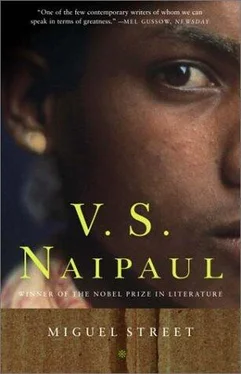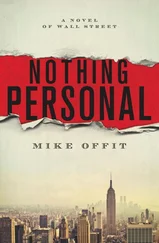‘It was a high-class place,’ he said, ‘no bums. Judges and doctors and big shot civil servants.’
‘What happen?’ Eddoes asked. ‘Jail?’
‘How you so stupid?’ Hat said. ‘Jail, when the man here with we. But why you people so stupid? Why you don’t let the man talk?’
But Bogart was offended, and refused to speak another word.
From then on the relationship between these men changed. Bogart became the Bogart of the films. Hat became Harrison. And the morning exchange became this:
‘Bogart!’
‘Shaddup, Hat!’
Bogart now became the most feared man in the street. Even Big Foot was said to be afraid of him. Bogart drank and swore and gambled with the best. He shouted rude remarks at girls walking by themselves in the street. He bought a hat, and pulled down the brim over his eyes. He became a regular sight, standing against the high concrete fence of his yard, hands in his pockets, one foot jammed against the wall, and an eternal cigarette in his mouth.
Then he disappeared again. He was playing cards with the gang in his room, and he got up and said, ‘I’m going to the latrine.’
They didn’t see him for four months.
When he returned, he had grown a little fatter but he had become a little more aggressive. His accent was now pure American. To complete the imitation, he began being expansive towards children. He called out to them in the streets, and gave them money to buy gum and chocolate. He loved stroking their heads, and giving them good advice.
The third time he went away and came back he gave a great party in his room for all the children or kids, as he called them. He bought cases of Solo and Coca-Cola and Pepsi-Cola and about a bushel of cakes.
Then Sergeant Charles, the policeman who lived up Miguel Street at number forty-five, came and arrested Bogart.
‘Don’t act tough, Bogart,’ Sergeant Charles said.
But Bogart failed to take the cue.
‘What happening, man? I ain’t do anything.’
Sergeant Charles told him.
There was a little stir in the papers. The charge was bigamy; but it was up to Hat to find out all the inside details that the newspapers never mention.
‘You see,’ Hat said on the pavement that evening, ‘the man leave his first wife in Tunapuna and come to Port of Spain. They couldn’t have children. He remain here feeling sad and small. He go away, find a girl in Caroni and he give she a baby. In Caroni they don’t make joke about that sort of thing and Bogart had to get married to the girl.’
‘But why he leave she?’ Eddoes asked.
‘To be a man, among we men.’
2. THE THING WITHOUT A NAME
The only thing that Popo, who called himself a carpenter, ever built was the little galvanised-iron workshop under the mango tree at the back of his yard. And even that he didn’t quite finish. He couldn’t be bothered to nail on the sheets of galvanised iron for the roof, and kept them weighted down with huge stones. Whenever there was a high wind the roof made a frightening banging noise and seemed ready to fly away.
And yet Popo was never idle. He was always busy hammering and sawing and planing. I liked watching him work. I liked the smell of the woods — cyp and cedar and crapaud. I liked the colour of the shavings, and I liked the way the sawdust powdered Popo’s kinky hair.
‘What you making, Mr Popo?’ I asked.
Popo would always say, ‘Ha, boy! That’s the question. I making the thing without a name.’
I liked Popo for that. I thought he was a poetic man.
One day I said to Popo, ‘Give me something to make.’
‘What you want to make?’ he said.
It was hard to think of something I really wanted.
‘You see,’ Popo said. ‘You thinking about the thing without a name.’
Eventually I decided on an egg-stand.
‘Who you making it for?’ Popo asked.
‘Ma.’
He laughed. ‘Think she going use it?’
My mother was pleased with the egg-stand, and used it for about a week. Then she seemed to forget all about it, and began putting the eggs in bowls or plates, just as she did before.
And Popo laughed when I told him. He said, ‘Boy, the only thing to make is the thing without a name.’
After I painted the tailoring sign for Bogart, Popo made me do one for him as well.
He took the little red stump of a pencil he had stuck over his ear and puzzled over the words. At first he wanted to announce himself as an architect; but I managed to dissuade him. He wasn’t sure about the spelling. The finished sign said:
BUILDER AND CONTRACTOR
Carpenter
And Cabinet-Maker
And I signed my name, as sign-writer, in the bottom right-hand corner.
Popo liked standing up in front of the sign. But he had a little panic when people who didn’t know about him came to inquire.
‘The carpenter fellow?’ Popo would say. ‘He don’t live here again.’
I thought Popo was a much nicer man than Bogart. Bogart said little to me, but Popo was always ready to talk. He talked about serious things, like life and death and work, and I felt he really liked talking to me.
Yet Popo was not a popular man in the street. They didn’t think he was mad or stupid. Hat used to say, ‘Topo too conceited, you hear.’
It was an unreasonable thing to say. Popo had the habit of taking a glass of rum to the pavement every morning. He never sipped the rum. But whenever he saw someone he knew he dipped his middle finger in the rum, licked it, and then waved to the man.
‘We could buy rum too,’ Hat used to say. ‘But we don’t show off like Popo.’
I myself never thought about it in that way, and one day I asked Popo about it.
Popo said, ‘Boy, in the morning, when the sun shining and it still cool, and you just get up, it make you feel good to know that you could go out and stand up in the sun and have some rum.’
Popo never made any money. His wife used to go out and work, and this was easy, because they had no children. Popo said, ‘Women and them like work. Man not make for work.’
Hat said, ‘Popo is a man-woman. Not a proper man.’
Popo’s wife had a job as a cook in a big house near my school. She used to wait for me in the afternoons and take me into the big kitchen and give me a lot of nice things to eat. The only thing I didn’t like was the way she sat and watched me while I ate. It was as though I was eating for her. She asked me to call her Auntie.
She introduced me to the gardener of the big house. He was a good-looking brown man, and he loved his flowers. I liked the gardens he looked after. The flower-beds were always black and wet; and the grass green and damp and always cut. Sometimes he let me water the flower-beds. And he used to gather the cut grass into little bags which he gave me to take home to my mother. Grass was good for the hens.
One day I missed Popo’s wife. She wasn’t waiting for me.
Next morning I didn’t see Popo dipping his finger in the glass of rum on the pavement.
And that evening I didn’t see Popo’s wife.
I found Popo sad in his workshop. He was sitting on a plank and twisting a bit of shaving around his fingers.
Popo said, ‘Your auntie gone, boy.’
‘Where, Mr Popo?’
‘Ha, boy! That’s the question,’ and he pulled himself up there.
Popo found himself then a popular man. The news got around very quickly. And when Eddoes said one day, ‘I wonder what happen to Popo. Like he got no more rum,’ Hat jumped up and almost cuffed him. And then all the men began to gather in Popo’s workshop, and they would talk about cricket and football and pictures — everything except women — just to try to cheer Popo up.
Popo’s workshop no longer sounded with hammering and sawing. The sawdust no longer smelled fresh, and became black, almost like dirt. Popo began drinking a lot, and I didn’t like him when he was drunk. He smelled of rum, and he used to cry and then grow angry and want to beat up everybody. That made him an accepted member of the gang.
Читать дальше












